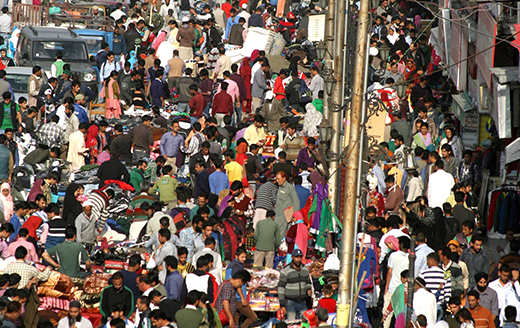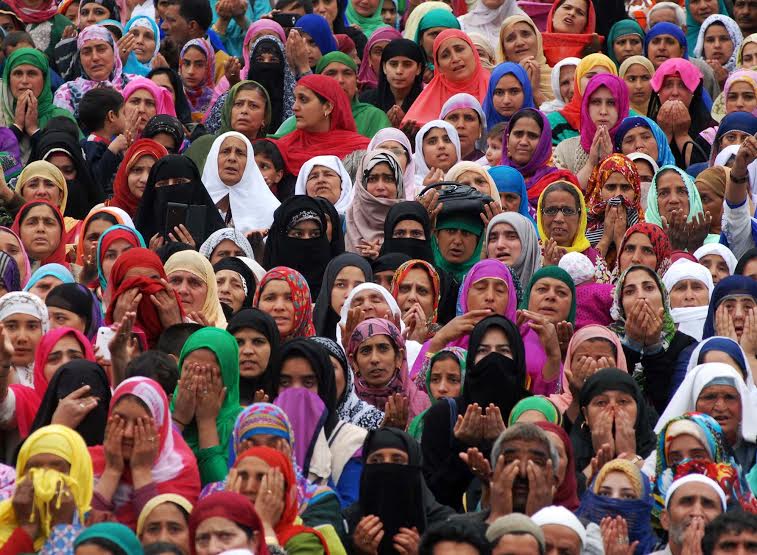As prayers and penance take a priority in the holy month of fasting, the business too doesn’t take a backseat. As Ibrahim Wani reports Ramdhan brings a surge in charities and spending as well.

The holy month of Ramadhan brings with it a spirit of prayers for the Muslim societies. Muslims ask for forgiveness, guidance and self restraint.
As prayers take priority, there is a perception that business activities take a backstage and the economy slows down. But contrary to the perception, business experiences an upsurge and economic activities thrive in this month.
Even in a small place like J&K, people spend hundreds of crores during these 30 days of fasting. The expenditure is high in the last week of the month when both charity and shopping see a surge.
Charities peak in Ramadhan starting right from the first day of the month. People can be seen offering donations in cash and kind at orphanages and charitable trusts.
Due to high virtues, most of the Zakat (Muslim tax on wealth) – which is 2.5 percent on savings – is being paid this month. Many people withdraw the interest accumulation in their bank accounts and give it to the needy. The ubiquitous population of orphans and the destitute – there are over a dozen orphanages across J&K– are the major beneficiaries in the month.
“Most of our yearly donations arrive this month. Last year we received Rs 42 lakh in Ramadhan,” said A R Hanjura, general secretary of Yateem Trust.
Estimates put the cumulative requirement of all the orphanages at around Rs. 13 crores and they raise almost half of it during the month of fasting.
The situation is similar for residential religious seminaries. “To manage the Darul-ul-aloom we take loans through out the year and are able to pay back these only through contributions in Ramzan” says Mohammad Akbar of Darul-ul-uloom Bilaliya, Lal Bazaar.
Most orphanages and religious schools advertise their activities, requirements, and bank accounts in local media asking for donations. A few hire cars and use public address systems to secure donations.
Sadka Fitr, an obligatory charity that must be paid before the Eid prayers is a major one time expenditure. Supposed to be paid in the last 48 hours of Ramadhan by Muslims, this money enables poor and underprivileged within the community to celebrate the Eid. This year the Sadka Fitr has been fixed at between Rs. 30 to Rs. 302 per head. Even if only 80 percent of 7.4 million Muslims in J&K pay this amount, it offers Rs 30 crore to a small population within hours before the Eid.
Pilgrimage economy
Pilgrimage to Mecca is a big business. Though pilgrims would start leaving in late October, the entire process of the Hajj starts this month that includes paying for tickets.

Compared to 6600 in 2007, 7728 pilgrims are flying to Saudi Arabia directly from Srinagar this year. “We had fewer seats to offer to 16000 aspirants but then central government gave us some additional quota”, a senior officer in state’s Hajj Committee said. Every pilgrim paying not less than Rs. 95,000 makes it a Rs 75 crores expenditure.
Apart form the state hajj agency, almost 600 pilgrims use the facilities of 17 private Haj and Umrah operators. Their cost of pilgrimage exceeds Rs. 1.5 lakh per head. “Some of them who combine Haj with pilgrimage to revered Shia Muslim sites in Iraq pay more,” said a tour operator Akbar Arshad. He adds that Hajj through unofficial channels is a yearly Rs. 10 crore business.
Many people opt for Umrah preferably in Ramadhan. “By and large around 10,000 people from J&K perform Umrah and 60 percent of them do it during the month of fasting”, said Anzar Hussain, insisting it is the major business in pilgrim tourism for private sector that generates around Rs. 50 crores a year.
Religious shopping
In addition to this a number of businesses also witness a boom during the month. The sale of dates, incense, religious books and items see a surge.
“We witness better sales of religious books in Ramzan. Our sales increase by 7-10 per cent in this period,” said Qari Suhail of Ashraf Book Centre.
Jamsheed Bhat a vendor of religious items like incense sticks, caps and rosaries say the sales of these items is high in Ramadhan compared to the rest of the year.

The last week of the month sees a surge in shopping as people prepare for the Eid ul Fitr. The hustle and the bustle in the commercial centres is high. Shopkeepers use all possible means to attract customers like special discounts.
“The customers at this time come with an intention to purchase and discounts are important in attracting them,” says Mubashir Ahmad proprietor of apparel shop King Cross.
Syed Nazar Bukhari, proprietor of the recently opened readymade garments shop Cantabil International at Poloview said, “The rush of customers is unanticipated this time. The market is looking up and we expect even better sales in the run up to Eid”. Other ready made garment shops have also witnessed a boom in sales.
Bashir Ahmad, the owner of a crockery shop Big Boss says, “The sales in the last 15 days of the month have been good and are increasing at a good pace in view of the upcoming Eid”.
The story is merrier for bakers and confectioners, who see maddening crowds thronging their shops in the days preceding Eid, as every merchant want to grab the pie of this huge market.















